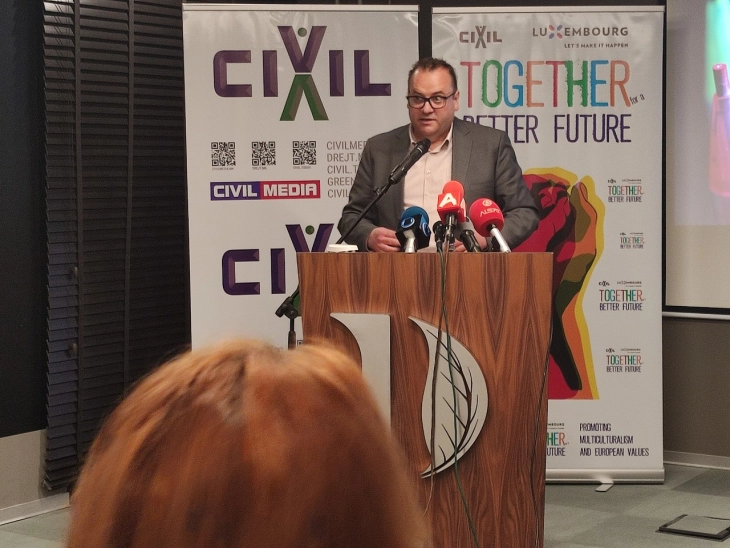Conference: Results achieved in inter-ethnic integration, challenges need overcoming
- Better integration, with respect for diversity, cannot be achieved through political processes alone. Unfortunately, we are witnessing that in some parts of the country, the different communities live not together, but beside each other, said President Stevo Pendarovski, adding that change should start at a young age, and that education should promote common values much more.
- Post By Nevenka Nikolik
- 16:57, 16 May, 2023

Skopje, 16 May 2023 (MIA) - Better integration, with respect for diversity, cannot be achieved through political processes alone. Unfortunately, we are witnessing that in some parts of the country, the different communities live not together, but beside each other, said President Stevo Pendarovski, adding that change should start at a young age, and that education should promote common values much more.
At the opening of the conference "Relations between communities: Perceptions, hopes and fears, challenges and solutions" organized by CIVIL- Center for Freedom, Pendarovski pointed out that the stagnation in European integration, ethnicization, and partisanship of politics and institutions, led to deep polarization in society and the challenge today, and in the future, is figuring out how to improve the situation.
According to President Pendarovski, most favorable conditions for multi-ethnic cohesion are offered by a functional democracy that can secure a united life for different identities in an ethically, linguistically, religiously heterogeneous society, like the Macedonian one. Eternal cohesion and functionality of democracy directly depend on the European integration and values, which have additional meaning in our specific domestic context.
"European integration and values are important for the Balkan region where stagnant tendencies still exist, with a destructive potential that, during multiple crisis, like the war in Ukraine, can negatively reflect on us. We are witnesses that dangerous narratives for big cities in the Balkans are still misused to mobilize the increasingly apathetic and fewer voters in the region, especially during elections. To such provocations we are also exposed from time to time, and the answer is clear - European integration is the only counterweight to all those who try to divide society, to turn communities against each other, in order to realize their antiquated ideas," Pendarovski told the conference organized on May 21 - World Day for Cultural Diversity.

"The work is far from finished, because the question of interethnic cohabitation can never be archived as finally answered. We need much bigger political and institutional support for the smaller ethnic communities in order to strengthen the specific Macedonian model of coexistence. Contrary to some interpretations, the Ohrid Framework Agreement is not only a Macedonian-Albanian agreement, but an agreement for all. It implies full integration within institutions of the state, not only for Albanians, but for all ethnic communities in North Macedonia, regardless of their size," the President said.
Robert Alagjozovski, the National Coordinator for interculturalism, pointed out that North Macedonia has active policies that cultivate diversity, and promote the rights of all ethnic communities, and that all state institutions have to improve capacities and protect and promote their rights.
"Unfortunately, in our country we have party and political circles that insist on ethno nationalistic, exclusionary, xenophobic policies that worsen the environment, disregarding government policies. We need to create cooperation, social cohesion platforms, and break those gaps, because although we have results, our society is still divided, which makes it an easy prey for ethno nationalistic policies," Alagjozovski noted.
Alagjozovski said that in recent years, a lot of support and assistance has been provided by various agencies - Agency for community rights realization, Ministry of Political System, Ministry of Culture, and many support funds have improved rights, while promoting multiculturalism and intercultural dialogue. They also improved multilingual education to students, and numerous professors and teachers have undergone training to improve their intercultural abilities, and the methodology for working in mixed communities.
Key concepts and policies from the European Council were also promoted, while insisting upon the values of essential communication between citizens. In the past 3-4 years, progress has been noted in reports from the Advisory Committee for the Protection of National Minorities, Commission on Protection against Discrimination, and EU reports, and they also identify challenges.
"Segregation is one of the challenges, and it is spatial - those are communities in which the citizens live in, and temporal - there still exists an old policy for different ethnic communities to go to school in different time schedules. It is a key challenge, and an obligation in the new strategy. In order to overcome it, interethnic integration must be promoted, first in schools, and also in all parts of society," Alagjozovski explained.

Petar Arsovski, honorary consul of Luxembourg, said that our capacity to treat our differences as an advantage, not a disability, is something we must learn.
"We are not born with it, nor have we inherited it from previous generations. We have to create it. Our ability to form a shared vision of the future is also something we must do. That is why investing in a continuous dialogue, in a conversation, a debate, exclusive political, social, and critical practices are very important for us. We are entering a time in which the geopolitical and geostrategic fate of our region, including ours, may be broken, but we must find the strength to take a real step toward some common vision," said Arsovski. ssh/nn/
Photo: MIA







